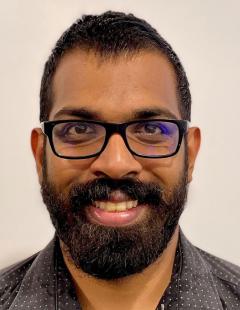Senith Abeyanayake
Tell us about your background
I am from Sri Lanka and my background is in economics and law. I worked as an economic policy analyst for two years, firstly at Verite Research, a Sri Lankan think tank, and then a brief stint at the European Union Delegation to Sri Lanka and the Maldives. My thematic focus at work included international trade, regulatory reform and agriculture value chains. I helped establish the International Trade Law Program of the Moot Court Bench, Sri Lanka's first dedicated platform for training and advocacy in international trade law.

“Given the diverse range of topics covered by the programs, students, and faculty, even casual conversations at lunch times or by the coffee machine will leave me with food for thought!”
“Given the diverse range of topics covered by the programs, students, and faculty, even casual conversations at lunch times or by the coffee machine will leave me with food for thought!”
What made you choose to study at ODID?
When applying, I was particularly drawn to ODID for two reasons.
Firstly, the body of research done by ODID, and affiliated institutions such as the Centre for the Study of African Economies (CSAE) has significant focus on South Asia and Africa, two regions I am personally interested in.
Secondly, some of its faculty members were authors of papers I had come across during my work. This motivated me, especially because of the broad access to faculty that ODID provides for its students.
What do you particularly like about ODID?
I liked the friendly atmosphere in ODID. It is an inclusive and easy-going space which inspires conversation and collaboration. Given the diverse range of topics covered by the programs, students, and faculty, even casual conversations at lunch times or by the coffee machine will leave me with food for thought!
The ODID staff is supportive and caring, always going the extra step to keep everyone comfortable and happy. It is not uncommon for plates of free biscuits to magically appear during the height of exam stress.
ODID also gives its students access to events and conferences such as the CSAE conference, which I found deeply insightful.
What do you particularly like about your course of study?
The content is a mix of theoretical and empirical economics with a focus on its application to developmental problems. I found this mix particularly useful as someone who has worked in research between my undergraduate and master's. The course content allows the student the room to specialize depending on individual preferences and future career requirements. I also found the small cohort size conducive to shared learning and lifelong friendships.
What did you research for your dissertation?
My dissertation questions whether the Covid-19 pandemic and related responses had a differential impact on female labor market outcomes in Sri Lanka. Given that Sri Lanka does not have surveys which track the same individuals or households across time (panel datasets), my dissertation explores the possibility of using a series of repeated cross-sectional datasets to create a 'pseudo' panel dataset to answer the question. I find evidence of higher labor force exits, unemployment, and involuntary underemployment among females compared to males, which point to gendered implications of the role of care burdens, gendered societal norms surrounding job selection, and structural barriers on the labor market.
What other activities have you been involved in at Oxford?
I am a choral scholar at my college choir (Harris Manchester). We have sung at the weekly Evensong at the college chapel every Wednesday evening. I also play tennis for the college team and am the food and beverage officer at the college Middle Common Room (MCR).
Is life at Oxford different from how you expected it to be?
Yes. As a student who is studying abroad for the first time, I thought I would take time to adjust and make friends in a new environment. I think the collegiate structure at Oxford, along with the friendly atmosphere at ODID, helped me settle in much faster than I expected.
What advice would you give to someone thinking of applying?
Everyone here is just like everyone else. Believe in yourself and think hard on what inspires you to pursue developmental economics and how it fits into your journey beyond the masters.
